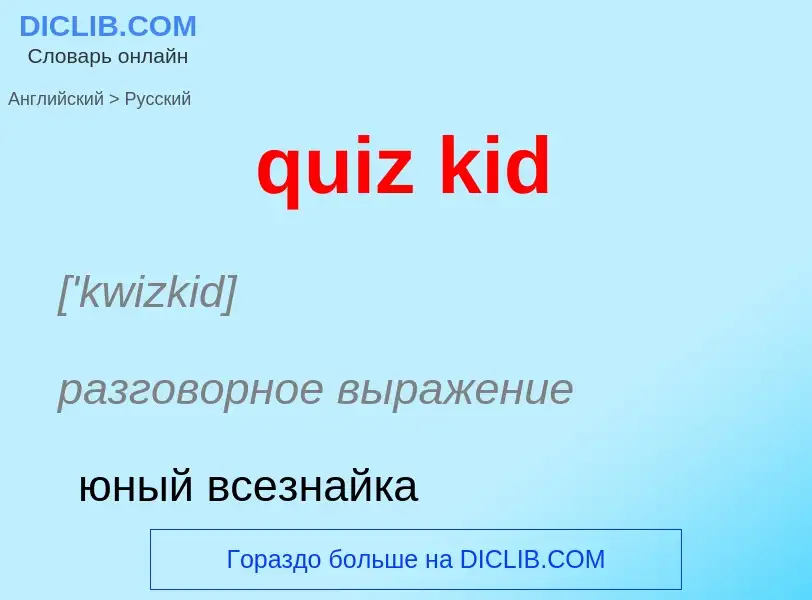Traducción y análisis de palabras por inteligencia artificial ChatGPT
En esta página puede obtener un análisis detallado de una palabra o frase, producido utilizando la mejor tecnología de inteligencia artificial hasta la fecha:
- cómo se usa la palabra
- frecuencia de uso
- se utiliza con más frecuencia en el habla oral o escrita
- opciones de traducción
- ejemplos de uso (varias frases con traducción)
- etimología
quiz kid - traducción al ruso
['kwizkid]
разговорное выражение
юный всезнайка
[kwɪz]
общая лексика
викторина (по радио, телевидению, в газете, журнале и т.п., обыкн. с призами за правильные ответы)
существительное
[kwiz]
общая лексика
насмешник
зубоскал
насмешка
шутка
мистификация
насмешливый взгляд
серия вопросов
викторина
проверочные вопросы
опрос
устаревшее выражение
монокль
лорнет
редкое выражение
чудак
оригинал
сумасброд
странная вещь
американизм
контрольный опрос (в классе)
устная или письменная проверка (без предварительной подготовки)
экзамен
глагол
[kwiz]
общая лексика
насмехаться
подшучивать
поддразнивать
насмешливо смотреть (на кого-л.)
разглядывать (кого-л.) с усмешкой или любопытством
выспрашивать (кого-л. о чём-л.)
выпытывать (что-л. у кого-л.)
допрашивать (кого-л.)
допытываться
производить опрос
американизм
опрашивать
производить контрольный опрос (в классе)
проводить устную или письменную проверку (без предварительной подготовки)
проводить проверочные испытания
устаревшее выражение
насмехаться или подшучивать (над чем-л.)
смотреть насмешливо или с любопытством
синоним
Definición
Wikipedia

Quiz Kids is a radio and TV series originally broadcast in the 1940s and 1950s. Created by Chicago public relations and advertising man Louis G. Cowan, and originally sponsored by Alka-Seltzer, the series was first broadcast on NBC from Chicago, June 28, 1940, airing as a summer replacement show for Alec Templeton Time. It continued on radio for the next 13 years. On television, the show was seen on NBC and CBS from July 6, 1949 to July 5, 1953, with Joe Kelly as quizmaster, and again from January 12 to September 27, 1956, with Clifton Fadiman as host.
The premise of the original show involved Kelly asking questions sent in by listeners and researched by Eliza Hickok and Rachel Stevenson. Kelly often said that he was not an intellectual, and that he could not have answered any of the questions without knowing the answer from his flash card. The answers were supplied by a panel of five children, chosen for their high IQs, strong academic interests, and appealing personalities, as well as such qualities as poise, quickness, and sense of humor. One of the first Quiz Kids was seven-year-old nature expert Gerard Darrow. For the initial premiere panel he was joined by Mary Ann Anderson, Joan Bishop, George Van Dyke Tiers and Charles Schwartz.
Other Quiz Kids of the 1940s included: Joan Alizier, Lois Jean Ashbeck, Jack Beckman, Claude Brenner, Geraldine Hamburg, Mary Clare McHugh, David Nasatir, Sally Ann Wilhelm, Ruth Duskin, war refugee Gunther Hollander, Shel Talmy, and math experts Joel Kupperman and Richard Williams. Panelists rotated, with the three top scorers each week joined by two others the following week; they were no longer eligible to participate once they reached the age of 16.


.jpg?width=200)

